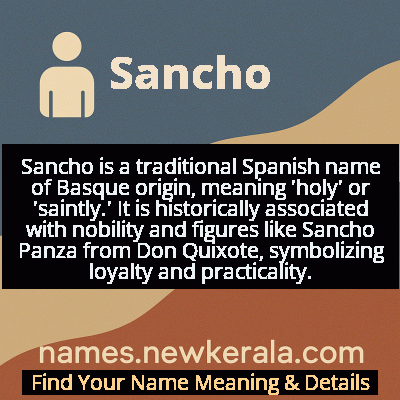Sancho Name Meaning & Details
Origin, Popularity, Numerology Analysis & Name Meaning of Sancho
Discover the origin, meaning, and cultural significance of the name SANCHO. Delve into its historical roots and explore the lasting impact it has had on communities and traditions.
Name
Sancho
Gender
Male
Origin
Spanish
Lucky Number
6
Meaning of the Name - Sancho
Sancho is a traditional Spanish name of Basque origin, meaning 'holy' or 'saintly.' It is historically associated with nobility and figures like Sancho Panza from Don Quixote, symbolizing loyalty and practicality.
Sancho - Complete Numerology Analysis
Your Numerology Number
Based on Pythagorean Numerology System
Ruling Planet
Venus
Positive Nature
Harmonious, responsible, caring, and artistic.
Negative Traits
Overly idealistic, superficial, possessive, or jealous.
Lucky Colours
Pink, turquoise.
Lucky Days
Friday.
Lucky Stones
Diamond, turquoise.
Harmony Numbers
2, 3, 9.
Best Suited Professions
Artists, musicians, teachers, healthcare workers.
What People Like About You
Warmth, nurturing nature, artistic flair.
Famous People Named Sancho
Sancho I of Pamplona
Monarch
Expanded the Kingdom of Pamplona and established the Jiménez dynasty
Sancho III of Castile
Monarch
Ruled during the Reconquista period and maintained Castilian sovereignty
Sancho Panza
Literary Character
Created the archetype of the loyal, pragmatic companion in Western literature
Sancho Gracia
Actor
Iconic Spanish actor with numerous awards and decades of television success
Name Variations & International Equivalents
Click on blue names to explore their detailed meanings. Gray names with will be available soon.
Cultural & Historical Significance
Extended Personality Analysis
The name Sancho evokes a personality profile characterized by grounded practicality, unwavering loyalty, and earthy wisdom. Drawing heavily from the literary archetype of Sancho Panza, individuals with this name are often perceived as the voice of reason in any situation. They typically exhibit strong common sense and a realistic approach to problem-solving, preferring practical solutions over theoretical ones. Their loyalty is one of their defining characteristics—once they commit to a person, cause, or organization, they remain steadfast through challenges and difficulties. Sanchos are often described as having a good-natured humor and approachability that makes them excellent companions and trusted advisors. They tend to be observant and perceptive, with an ability to read situations and people accurately. While they may not seek leadership positions, they often become the backbone of any group or organization due to their reliability and practical intelligence. Their strength lies in their consistency and their ability to maintain perspective when others might become carried away by emotion or idealism.
Modern Usage & Popularity
In contemporary naming practices, Sancho maintains a distinctive niche that balances tradition with literary appeal. While not among the most popular names in Spain today (ranking outside the top 200 in recent years), it enjoys steady usage particularly in regions with strong historical connections to the name, such as Navarre and Castile. The name has experienced periodic revivals, often coinciding with cultural events or anniversaries related to 'Don Quixote'. Among Spanish-speaking communities in the Americas, the name appears with moderate frequency, often chosen by parents seeking names with deep cultural roots rather than following current trends. Modern usage reflects an appreciation for the name's rich historical and literary associations, with parents valuing its distinctive sound and the positive qualities embodied by Sancho Panza. The name's relative rarity in contemporary times adds to its appeal for parents seeking traditional yet uncommon names with substantial cultural weight and positive connotations.
Symbolic & Spiritual Meanings
Symbolically, Sancho represents the essential balance between dream and reality, vision and implementation. The name embodies the virtue of practical wisdom—the ability to navigate the world as it is while remaining faithful to higher ideals. Through the character of Sancho Panza, the name has become a symbol of loyal companionship and the importance of grounded perspectives in the pursuit of grand visions. It represents the wisdom that comes from lived experience rather than abstract knowledge, and the value of consistency over dramatic heroism. In a broader cultural context, Sancho symbolizes the Spanish values of lealtad (loyalty), cordura (sanity), and pragmatismo (pragmatism). The name carries connotations of reliability and steadfastness, suggesting that true strength often lies in enduring commitment rather than fleeting brilliance. It serves as a reminder that every visionary needs a practical partner, and that the most meaningful achievements often result from the collaboration between idealistic dreams and realistic execution.

